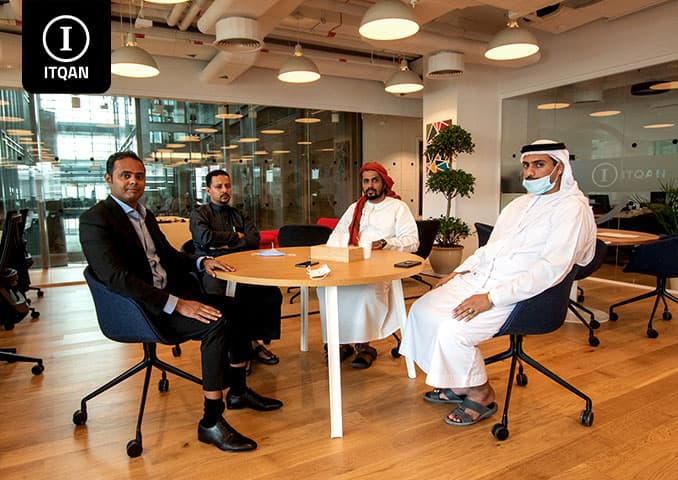Running a startup in Dubai requires a set of skills and strategic planning to succeed in a dynamic and evolving market. Dubai is one of the most important global destinations for business and investment, providing an ideal business environment that supports innovation and growth. The city is characterized by a strong infrastructure, government policies that support businesses, and provides many free zones that provide multiple benefits to startup owners, such as tax exemptions and full foreign ownership. We will learn about how to run a startup in Dubai? .
To successfully run a startup in Dubai, it is necessary to understand the local market and its requirements, in addition to reviewing the legal regulations and systems for establishing companies in the Emirates. Managing financial affairs carefully and controlling cash flows are essential to ensure the continuity of the company. In addition, the success of startups in Dubai requires forming a distinguished work team capable of achieving the company’s goals and adapting to the changing challenges in the market.
Technology also plays a pivotal role in supporting startups, as technological tools and digital innovations must be used to improve operations and increase productivity. It is also essential for entrepreneurs to build a strong network of relationships with investors and local partners to enhance growth and expansion opportunities.
Effective marketing and public relations management is another important element to ensure that the company reaches its target audience and expands its customer base. In addition, you must have a long-term strategy for sustainable growth with the ability to adjust the plan according to developments and changes in the market.
Regardless of the challenges, Dubai offers an environment rich in opportunities for startups, where business owners can benefit from government support and initiatives aimed at promoting entrepreneurship in the region

جدول المحتوى
ToggleHow to Run a Startup in Dubai?
Running a startup in Dubai requires effective strategies to adapt to the diverse and dynamic business environment in the emirate. Here are some basic steps to follow:
Strategic Planning: Before starting any business, a clear business plan should be developed that outlines the objectives, target market, and budget. Planning helps guide the company towards growth and success. Dubai is a global business hub, which means that understanding the local and international market is vital.
Finance Management: Good financial management is the foundation of any startup’s success. It is essential to develop a tight budget to manage cash flows effectively. In addition, Dubai offers many funding opportunities such as angel investors, investment funds, and government grants to support startups.
Adapting to Technology: Dubai is known for its technological advancement and embrace of innovation, so adopting technology and innovation are crucial factors in running your startup. Using technology tools to improve efficiency and increase productivity can help reduce costs and boost growth.
Building a Strong Team: Choosing a dedicated and collaborative team is a key factor in the success of your company. Startups need small, flexible teams that can quickly adapt to challenges and change. Dubai also attracts talent from all over the world, providing opportunities to hire the best expertise.
Marketing and building relationships: Digital marketing is key to success in a city like Dubai. Leveraging social media and digital platforms to reach a wide audience is essential. Building strong relationships with customers, partners, and investors also helps to strengthen a company’s position and expand its business.
Compliance with laws and regulations: Dubai has clear laws and an encouraging business environment, but it is important to adhere to all legal and regulatory regulations. Make sure to obtain the necessary licenses and permits and operate your business in accordance with local laws to ensure you avoid any future legal issues.
Benefit from government and community support: Dubai offers many government initiatives to support startups such as free zones, incubators and accelerators, and financing programs. These tools can help reduce costs and achieve faster growth.
Types of companies in Dubai
In Dubai, like the UAE in general, there are several types of companies that can be established and operated. Here are some types of companies in Dubai:
Sole Proprietorship: Managed by one person, who is solely responsible for the debts and financial obligations of the company.
Limited Liability Company (LLC): This is a common form of company in Dubai where shareholders are only liable to the extent of their capital.
Partnership: A partnership between multiple partners who share profits, losses and liabilities.
Public Joint Stock Company: This is a publicly traded company that requires a large capital.
Private Joint Stock Company: Different from a public company in that it is not publicly traded.
Free Zone Company: Offers companies the opportunity to establish and operate flexibly with benefits such as full foreign ownership and no tax on profits.
Free Zone Establishment: Allows one person to establish a company in a free zone with benefits such as full foreign ownership.
Branch of a Foreign Company: Foreign companies are allowed to open a branch in Dubai to represent them and carry out their business activities there.
Basic papers for establishing companies in Dubai
To establish a company in Dubai, there are a set of basic papers and documents that must be submitted to obtain the necessary licenses and approvals. Requirements vary slightly depending on the type of company and location (such as free zones or outside), but in general, the basic papers include the following:
A copy of the passport: for all partners or shareholders in the company.
A personal photo: the size of a passport photo for each partner.
A copy of the residence visa or visit visa: if the partner or founder is a resident or visitor in the UAE.
A memorandum of understanding or articles of association: which shows the details of the partnership, the percentages owned by each partner, and the distribution of profits.
Proposed company name: The company name must be reserved and chosen according to the standards of the Department of Economic Development (DED).
Initial approval from the competent authorities: if the business activity requires additional approvals from certain authorities (such as the Ministry of Health or Tourism).
A business plan: explains the objectives and business activities of the company, especially if the company is in a free zone.
A power of attorney: if the papers are submitted or procedures are handled through an agent or third party.
A lease contract: for the business location (may be necessary depending on the type of company and location).
Additional Licenses and Approvals: For certain specific business activities such as medical, educational or financial activities.
In conclusion, running a startup in Dubai requires a combination of good planning, careful execution, and the ability to adapt to a rapidly changing business environment. With its advanced infrastructure and diverse economic environment, Dubai offers great opportunities for startups, but it also poses challenges related to high competition and continuous innovation.
One of the key keys to running a successful startup is understanding the local market and the rules and regulations governing business in Dubai. Startups’ adherence to applicable regulations enhances their credibility and helps build a strong relationship with customers and investors. In addition, leveraging the resources available in free zones can provide startups with many advantages such as tax exemptions and supportive infrastructure.
Managing financial resources wisely is a vital aspect of any startup’s success, as success in Dubai requires carefully controlling expenses and revenues while taking into account available investment opportunities. Hiring the right talent and developing team skills are also essential elements for growth and sustainability, especially in a fast-evolving environment like Dubai.
Furthermore, innovation and the use of modern technology can give startups in Dubai a strong competitive advantage. Investing in digital solutions and digital transformation can help improve operational efficiency and increase access to new markets.
Ultimately, patience and commitment are essential values for startup owners, as success in Dubai requires a long-term vision and adapting to changing challenges. With a clear strategy and effective management approach, startups can achieve success and sustainable growth in one of the fastest growing cities in the world.
Top FAQs about starting a business in Dubai
What types of licenses are required to start a business in Dubai?
Licenses depend on the type of company, and can include general commercial licenses, industrial licenses, or service licenses.
What are the differences between companies in free zones and regular companies in Dubai?
Companies in free zones enjoy benefits such as full foreign ownership, no taxes on profits, and simple registration procedures.
What is the minimum capital required to start a company in Dubai?
The minimum capital depends on the type of company, as there are specific financial requirements for some types of companies such as limited liability companies.
What taxes must be paid by companies in Dubai?
In free zones, companies may be tax-exempt for a certain period, while regular companies need to pay VAT and corporate tax.
What are the legal requirements for setting up a company in Dubai?
The legal requirements include providing the necessary documents such as a passport, signing the necessary contracts, and complying with local laws.

















